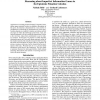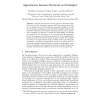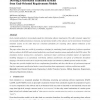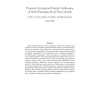1568 search results - page 286 / 314 » Fusions of Description Logics |
124
click to vote
AAAI
2010
15 years 3 months ago
2010
Approaches to reasoning about knowledge in imperfect information games typically involve an exhaustive description of the game, the dynamics characterized by a tree and the incomp...
127
click to vote
DEXA
2010
Springer
15 years 3 months ago
2010
Springer
With the development of more expressive description logics (DLs) for the Web Ontology Language OWL the question arises how we can properly deal with the high computational complexi...
100
click to vote
ASE
2008
15 years 2 months ago
2008
Goal-oriented methods are increasingly popular for elaborating software requirements. They offer systematic support for incrementally building intentional, structural, and operati...
115
Voted
CORR
2008
Springer
15 years 1 months ago
2008
Springer
This article introduces a fully automated verification technique that permits to analyze real-time systems described using a continuous notion of time and a mixture of operational...
150
click to vote
ECEASST
2008
15 years 1 months ago
2008
The OCL (Object Constraint Language) as part of the UML (Unified Modeling Language) is a rich language with different collection kinds (sets, multi-sets, sequences) and a large var...




